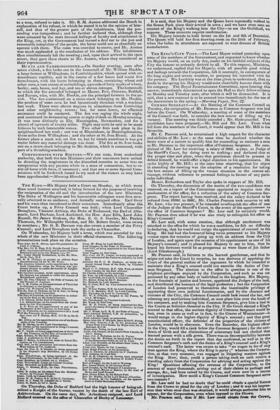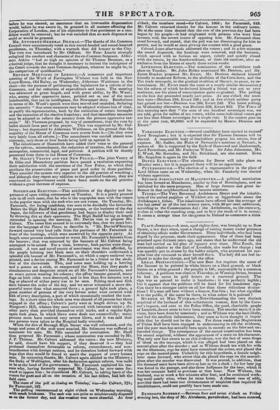THE Ktica's CITY - Vrsir.—The Lord Mayor waited yesterday upon some
of the members of the Government, and requested to know whether his Majesty would, on an early day, confer on his faithful subjects of the City the honour so ardently desired by all. To this request, Ministers, we understand, replied that his Majesty, with all possible good wishes and feelings towards the Corporation, felt it necessary, in consequence of the long nights and severe weather, to postpone his intended visit for the present. His Lordship was at the time given to understand, that no doubt in the spring his Majesty would most cheerfully honour them with his company. The Royal Entertainment Committee, upon hearing this answer, immediately determined to open the Hall to ;heir fellow-citizens on Monday and Tuesday next, after which it will be dismantled. It is said, that a new contract is to be entered into immediately for the use of the decorations in the spring.—Morning Paper, Nov. 27.
COM MON SERGEANT—At the Meeting of the Common Council on Tuesday, the resignation of Mr. Denman as Common Sergeant was laid before the Court. On Wednesday, a meeting of some of the members of the Council was held, to-consider the best course of filling up the vacancy. The meeting was thinly attended ; Mr. Slade presided. Two candidates have been proposed,—Mr. Hill and Mr. Law. From what fell from the members of the Court, it would appear that Mr. Hill is the favourite.
Mr. C. Pearson said, he entertained a high respect for the character and abilities of Mr. Law ; at the same time he doubted whether the latter were of a nature to qualify him for succeeding so eminent a man as Mr. Denman in the important office of Common Sergeant. He com- plained of Mr. Law for receiving a salary of 3001. a-year, as Judge of the Sheriff's Court, for doing next to nothing : and declared that at the proper time and place, when that gentleman should be present to defend himself, he would offer a legal objection to his appointment. He spoke highly of Mr. Hill ; at the same time observing, that his object in attending the meeting was the adoption of a resolution for taking the best means of filling up the vacant situation to the utmost ad- vantage, without reference to personal feelings in favour of any parti- cular individual.
Messrs. Richardson and Taylor also spoke in support of Mr. Hill.
On Thursday, the discussion of the merits of the two candidates was renewed, on a report of the Committee appointed to inquire into the emoluments of _Ole office,' for a reduction of the salary of Common Ser- geant. The report having been received, and the salary declared to be reduced from 10001. to 8001., Mr. Charles Pearson took occasion to ask Mr. Law, who was present, if he intended torelinquish the office of one of the Judges of the Sheriff's Court, in the event af-his appointment- to the office of Common Sergeant ? Mr: Law said he certainly would. Mr. Pearson then asked if he was also ready to relinquish his office as King's Counsel ? Mr. Law said, with some emotion, that although emolument was attached to the office for which he was a candidate, he felt no difficulty in declaring, that he would not resign the appointment of counsel to the King. He had had the honourof being twice presented to his Majesty —once upon the occasion of going up with an address from the City of London, and again upon the occasion of his appointment as one of his Majesty's counsel ; and it pleased his Majesty to say to him, that he hoped his fortunes would be as prosperous as were those of his father (Lord Ellenborough.) Mr. Pearson said, in fairness to the learned gentleman, and that he mignt not take the Court by surprise, he was desirous of apprising the Court of the general outline of the argument by which he intended to maintain that a King's counsel could not exercise the duties of Com- mon Sergeant. The election to the office in question is one of the brightest privileges enjoyed by the Corporation, and such as was not possessed by any other body or individual in the kingdom. His Majesty, as the fountain of justice and honour, appointed the Judges of the land, and distributed the honours of the legal profession ; but the Corporation of London had preserved to themselves the inestimable privilege of appointing their own judicial functionaries, and by the charters and customs of the City, the Common Council could look round the bar, and selecting any meritorious individual, at once place-him over the heads of his compeers, and by making him Common Sergeant, give him a lead in the Courts as Solicitor-General to the City. If the Court elected a Kingli counsel to that office, the ancient dignity of Common Sergeant would be lost, even in name as well as in fact, in the Courts of Westminster—it would merge in the higher dignity of King's counsel; and that great constitutional officer, the defender of the properties of the citizens of London, would be in abeyance. Even the Recorder, the highest officer in the City, would fill a rank below the Common Sergeant ;-for the acci- dents of birth and the distinctions of aristocracy had not clothed that learned person with a silk gown. There was an imcompatibility between the duties set forth in the report that day confirmed, as well-as M the Common Sergeant's oath and the duties of a King's counsel ancia King's counsel's oath: The latter was sworn to take "no wages in fee of any man against the King, where the King is party ;" whereas the Corpora- tion, at that very moment, was engaged in litigating matters against the King. How, then, could a person taking_ such an oath receive standing salary from the Corporation for advising and acting against the King? Questions affecting the revenue of the Corporation, to the amount of many thousands, arising out of their clainis to package and scavage, &c., had been raised by the Crown, and were now in a course of investigation. How could a King's Counsel Con:anon Sergeant serve two masters ? Mr. Law said he had no doubt that' he could obtain- a special licence from the Crown to plead for the city .of. London ; and it was his impres sion that when once that warobtained, it would always authorise him to appear, for the Corporation; even when 'Opposed to the Crown. Mr: Pearson- said, that. if _Mr. Law .could obtain front the Crown, before he was elected, an assurance that an irrevocable dispensation would, before he was sworn in, be granted in all matters affecting the Corporation of London, one of his objections to that gentleman as a can- didate would be removed; but he was satisfied that no such dispensiSon could or would be granted.
Ma. ATTORNEY-GENERAL DENMAN.—The thanks of the Common Council were unanimously voted to this sound-headed and sound-hearted gentleman, on Thursday, with a warmth that did honour to the City. The vote was introduced by Mr. Oldham. Sir Peter Laurie strongly eulogized the conduct and character of the ex-Common Sergeant. Alder- man Atkins " had so high an opinion of Sir Thomas Denman, as a criminal judge, that he thought it necessary to intreat the indulgence of the Court towards the next Common-Sergeant, whoever he might be, in the comparison of qualification." REFORM MEETINGS IN LONDON.—A numerous and important meeting of the Ward of Farringdon Without was held in the New Court-House, Old Bailey, on Wednesday, Alderman Waithman in the chair—for the purpose of petitioning the legislature for a reform of the Commons, and for reduction of expenditure and taxes. The meeting was addressed at great length, and with great ability, by Mr. Wood ; who, among other oppressive taxes, pointed out as one of the most indefensible, that tax on intelligence, the Newspaper-duty. Resolutions in terms of Mr. Wood's speech were then moved and seconded, declaring the necessity " that some measures may be adopted without loss of time, to purify the representation, both by the extinction of rotten boroughs and the extension of the elective franchise; and that immediate measures may be adopted to relieve the country from the present oppressive tax- ation." Mr. Thomson proposed, by way of amendment, that the vote by 'ballot should form part of the prayer. This was supported by Mr. Gal- loway: but deprecated by Alderman Waithman, on the ground that the majority of the House of Commons were averse from it.—[So they were very lately from all reform.}— The amendment was carried almost una- nimously, only three or four hands being held up against it.
The inhabitants of Shoreditch have added their voice to the general cry for reform, retrenchment, the reduction of taxation, the abolition of monopolies, commercial, legal, and political. A. petition will be shortly presented from them to the House of Commons.
ST. GILES'S VESTRY AND THE NEW PomcE.—The joint Vestry of St. Giles and Bloomsbury parishes have passed a resolution expressing their satisfaction with the exertions of the New .Police, to which they attribute the preservation of peace and good order in those parishes. They consider the system very superior to the old practice of watching ; and although they regret any addition to the parochial burdens, they are convinced no improvement could have been made on the old practice without a great increase of expense..



























 Previous page
Previous page